Seromas at incision sites are normal but I would always ask the vet who did the surgery to verify.
We have 3 female cats. Our 2 cats, Margo and Edith, are now 3 years old and grew up together. Gwen is the 3rd, a kitten we rescued a few months ago. Gwen is not yet spayed but she is peeing on things throughout the house and causing Margo to mark her territory. I am here to get help with our situation and resolve the peeing and behavioral issues.
We found out the Gwen has elevated liver enzymes so she is being treated for that. Margo is on prescribed calming treats to help. Both older cats chase Gwen with intent as if they are annoyed or angry with her.
We have multiple litter boxes and plenty of places for them to avoid each other if they please.
Gwen is giving us a lot of trouble with peeing on clothes and random objects in the house and it is getting progressively worse…she is not yet spayed but we are at a loss as opposed to what to do or what is going on.
Can anyone provide some answers and suggestions as to why this is happening?
Thank you in advance!
Comments
My 1 year old Golden Doodle was neutered last week. The incision is healing nicely, but I am noticing some red fluid filled sacs on each side of the incision. He is acting ok and occasionally tries to lick the area. I noticed one sac burst and fluid came out, not bloody just pink. Is this normal?? He doesn’t seem to be in pain. Thank you!
Comments
My 4 year old lab has chronic ear infections. We have a great system in place (regular ear cleanings, steroid drops during an infection, and anti inflammatory when it’s really bothersome to him) to try to stay ahead of them, and treat them from home when he has a flare up. Recently during a flare up (about 2 weeks ago) he developed a lump on the inside of his ear that I thought was a scab from scratching, but now I’m worried it could be some kind of skin cancer. Or is it just scar tissue and since it’s on the ear is a little more raised? Should I take him in to be seen for this or monitor it a little longer to see if it heals and goes away? It doesn’t seem to cause him any pain, he’s more concerned about his itchy ears.
Comments
My cat was blocked Wednesday, the vet had a hard time getting catheter in. The unblocked him. Sent him home with pain meds and proposing.
He didn’t go to the bathroom at all that night
I took him back Thursday morning, they drained his bladder again . He had alot of bloodclots.
They told me next option was to hospitalize him.
But sent him home with a sedative to keep him relaxed and hopefully he can pee..
Mufasa has been drinking water. It looks like he has pass dribbles of pee in the litter box.
My question is if they had a hard time getting the catheter in the first time, will another place be able to get one in and keep him monitored?
Going on the third day and I am so worried keeping him sedated and not knowing if he is actually blocking back up
Comments
Hi
My 4 y old cat had pyometraand hystrectomy and ovarian removal done 40 days ago . After the surgery, I noticed that she became less active and cannot jump as she used to do before.
Before she was used to jump easily and directly to get on the bed but now she climbs onto an adjacent arm chair and then walks to the bed Also before she was able to scratch her ear by her leg , but now she is not able to do that.
She’s trying but can’t raise her leg to her ear.
Is it possible that her legs become weaker as a complication of the surgery?
Is it normal for a cat to be less active for this long time after a pyometra surgery ?
What should I do to help her regain her normal movement ?
I really appreciate what you are doing , many thanks.
Comments
My dachshund Lucy is now starting her 3rd week of conservative home care for IVDD from C1-2 with paralysis of front and rear legs with deep pain present in all extremities. She is currently on gabapentin, prednisone, pepcid, and methocarbamol. I’m trying my best to stay hopeful however she still has pain with any movement. The only time I move her is for repositioning, cleaning, and feeding. I can’t afford surgery due to spending several thousand at the ER vets where she was misdiagnosed numerous times. I will however do anything in my power to keep her happy, functional, and pain free. I’m fine with her ending up in a quad chair if that’s the best we can do. Am I doing my best?
Comments
This is the third day without Atlas — Apollo’s littermate, alpha and captain. We lost him due to hemorrhage and dehydration. He just recently turned 4 months. Apollo hasn’t been eating and drinking water today. Was asleep all the time, too. Previously, he wakes up at night and cries so he comes to me in bed to wake me up. Last night he started vomiting and having loose stools. I can also here rumbling in his stomach, and i think is passing gas. Earlier that day we went on a walk and had munched a few plants/weeds on the way. He has also accidentally taken in expired milk he left the other day. Today the stool had a few blood patches in it. I’m worried he might end up his brother. Is he only suffering from dog depression, or is there other medial conditions?
Comments
My cat is about 14 years old. Male. Last week really noticed he goes to litter often but doesnt go. But sometimes he did have a few times of clumped urine litter. So took to emergency clinic Sat 12/13/30. They could not get any urine to test. Sent home with antibiotics antiflamatory- pain meds and told to get in see regular vet.
Took to vet today 12/15/20. They were able to get a good stream of urine out as well as these blood clots tissues. See image. Said that I would need to ck his bladder ongoing to make sure it doesn’t get rock hard baseball sized. Gave me a medication to help dilate. Did blood panel and Im waiting to hear back on any other medications.
I feel like imaging should be done like yesterday.
If this blood clot tissue can happen again should he have been keep at vet to do something ?
Was this blood clot a actual plug and blockage. So since they got it out the blockage is gone at the moment?
I am just worried and dont want to make a mistake and not know if he has a full hard bladder.
Or did this clot coming out as he is good currently. How long would it take for another clot to form?
Any input advice would be much appreciated
Comments
In June my Labrador developed a lesion on her side. She was treated with antibiotics and a medicated shampoo with no success. Her hair started thinning and she developed a lesion on the opposite side. Bloodwork was run to test for Cushings which was negative. As she started to take a Cushings type appearance her docs followed up with an ultrasound. In October she had a punch biopsy. She was treated with Apoquel with no improvement. She has lesions on her chest, both sides near her hips and one near her hind end. I have never seen her itching or chewing. The lesions are crusty and pretty dense. Hair loss is only on her trunk.
A little history: my dog is 10 1/2, has spay induced incontinence, history of frequent UTI’s, frequent urination, and megaesophagus. She is on Dasuquin, Cranmate and Welactin. Despite her plethora of health issues she has never had skin issues. Typically her coat is blue-black, thick and shiny.
She doesn’t seem to be uncomfortable but she seems to have a pretty high pain threshold.
Thank you for your time.
Comments
My small 12 pound terrier/chihuahua mix has suddenly (in the past 24 hours) stopped jumping up on things – couch, chair, etc – which is very unusual because she prefers to be on the furniture. She will stand and stare at the couch and seem like she’s going to jump, she even starts to a bit, but then she won’t follow through. If I pick her up and put her on the couch, she will not hesitate at all to jump down when she’s ready. She will let me touch and move all of her legs and has not vocalized in pain. She walks and runs normally and will come up and down the stairs with no problem. I assume she has injured something. Is there an injury to a specific place that would cause her reluctance to jump up but not affect other behavior? (I should note that she is very independent and doesn’t like to be picked up, so it’s not that she’s preferring to be lifted up)






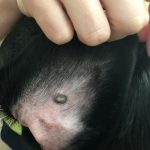


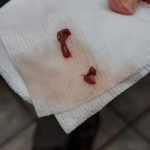

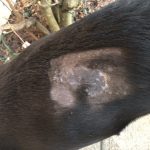

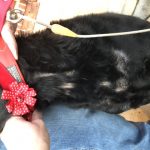
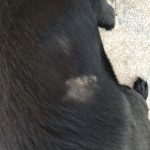

Hello,
Anytime I get a case like this I recommend a urinalysis be done. It is imperative to rule out a urinary issue. I also do a full blood work too. After that I talk about Feliway trying lots of treats and catnip and trying to understand what she is trying to tell you. They do everything for a reason so I don’t just medicate and turn a blind eye. I do talk about anti anxiety medications and there are lots of options s for this but it doesn’t change the fact that the case should be investigated thoroughly. This is a huge topic and in the texts book it can take up a hundred pages. There is not a one size fits all remedy.
Thank you for responding. We have tried Feliway wall plug ins and she gets a lot of attention but that doesn’t help. She’s had blood work done which revealed elevated liver enzymes but she it’s taking medication for that.
Is her not being spayed yet a possible reason?